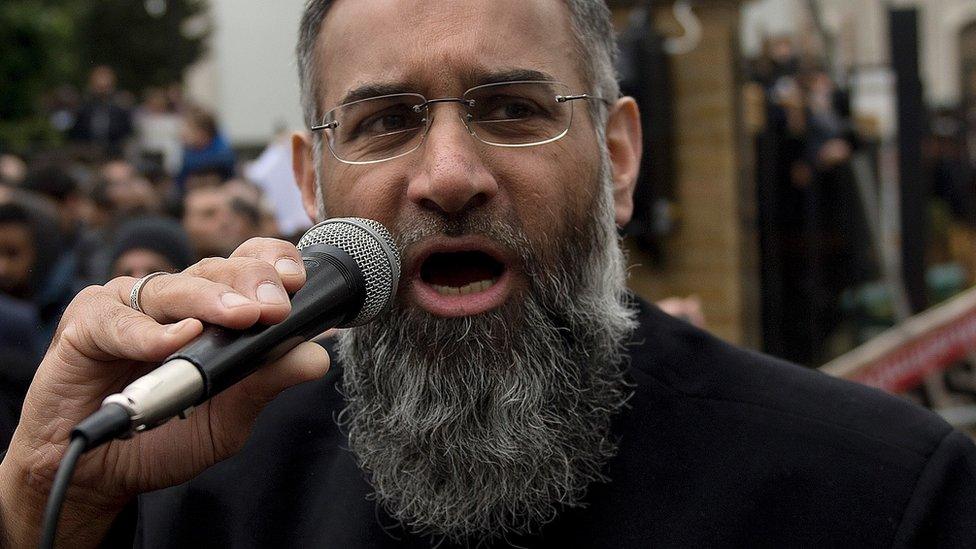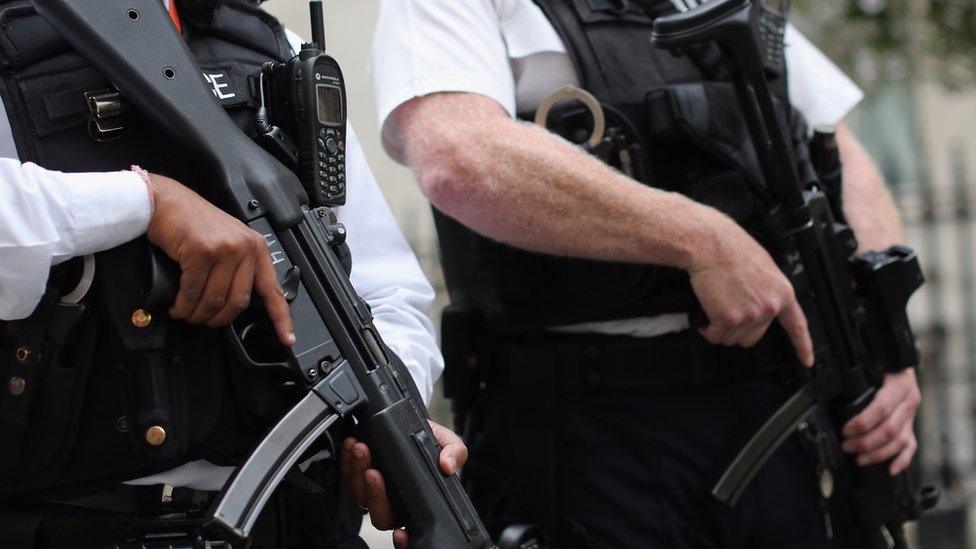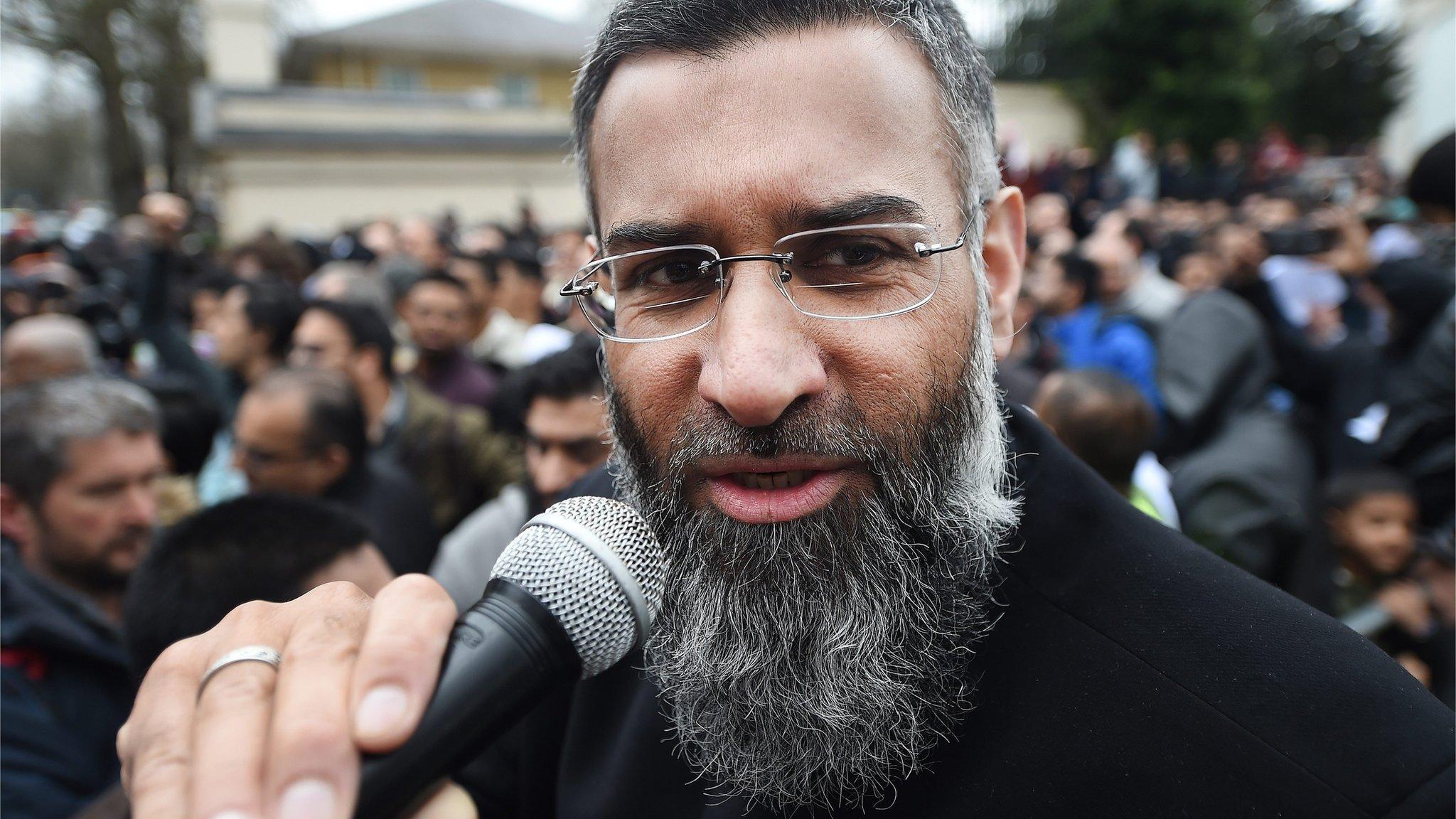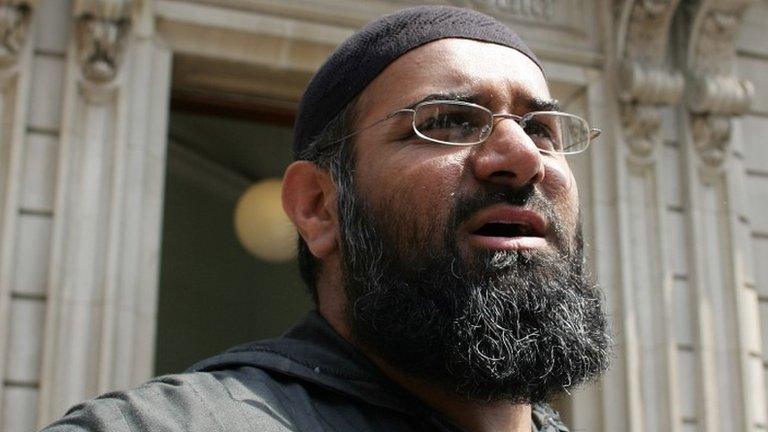Anjem Choudary: Security concerns over radical preacher release
- Published

Security concerns have been raised about the imminent release from prison of the radical preacher Anjem Choudary and other supporters of the banned extremist group al-Muhajiroun.
About a dozen followers are out or will be soon, as restrictive terror protection orders on others end.
A counter-terrorism activist says the group could become active again.
Security Minister Ben Wallace told BBC News the government works to reduce the risk of freed terrorist offenders.
He said there are a "suite of powers and measures we can put in place," adding: "Terrorist offenders have a lot more supervision than normal offenders and that's because we recognise the risk and we seek to reduce it to as low as possible."
Choudary will leave prison next month.
The firebrand preacher was convicted in August 2016 of inviting support for Islamic State and was jailed for five-and-a-half years.
Others in his network, including right-hand man Mizanur Rahman, were convicted of similar offences and will also be automatically released half way through their sentences.
Disastrous cocktail
The fact the releases will happen at the same time as an increased threat of violent extremism by far right groups is "troubling" for Adam Deen, who was a member of al-Muhajiroun (ALM) until 2003 but now works for the counter-extremism organisation Quilliam.
"Put that in the mix with the growing threat and the growing noise from the far right about anti-Muslim bigotry - that's a disastrous cocktail where young Muslim minds can be manipulated and used for the agenda of these extremist organisations," he said.
A further concern is that growing disorder in jails may be undermining efforts to de-radicalise extremist inmates, according to a former prison governor.
"Such is the state of lawlessness inside many of Britain's prisons where some of these people will have served their sentences, it isn't really realistic to assume that they've had any meaningful experience of counter-radicalisation," said Ian Acheson who wrote a report for the government on extremism in prisons., external
Some terrorist prisoners are isolated from the general prison population and Choudary reportedly spent some of his sentence in a newly-built separation centre at HMP Frankland in County Durham.
But Mr Acheson said some jails were now "ungoverned spaces where all sorts of things can flourish unchallenged" including "the spread of hateful and extremist ideologies".
'Pernicious impact'
From 2016 the authorities effectively silenced al-Muhajiroun through a range of measures but it is feared they may soon become active again.
"We suppressed their activities and their influence," said Richard Walton who ran Counter-Terrorism Command at the Metropolitan Police at the time.
"ALM was a constant thorn in our side over many years," said Mr Walton. "No one should underestimate the pernicious impact of the leaders of this group who were often charismatic and articulate."
The group was linked to violent jihadists who carried out terror attacks, including the killers of Fusilier Lee Rigby in 2013 and the London Bridge attack in which eight members of the pubic were killed in 2017.
Some of its members went to Syria where they fought with so-called Islamic State. They include Londoner Siddartha Dhar who the US State Department says has taken part in the murder of hostages. His current whereabouts are unknown.
The BBC understands that disquiet over the jail terms in some of the ALM cases is leading to change.
The Sentencing Council introduced new guidelines in March 2018, which could mean longer terms for those caught in the early stages of terror plotting.
Meanwhile, the Counter-Terrorism and Border Security Bill, external aims to increase the maximum sentence for some terror offences and to prevent automatic prison releases at the half way point for those who are still a risk to the public.
Some ALM activists have distanced themselves from the group while in detention, the BBC understands.

Police and intelligence agency resources are stretched
As well as released prisoners there are also ALM leaders whose freedom was severely curtailed by Terrorism Prevention and Investigation Measures (TPims).
They are placed on terror suspects by the home secretary, and usually end after two years.
Details of several orders have emerged in High Court appeal hearings and include:
JM, who "assumed leadership functions of ALM" said a judge. The TPim ended in the summer
LF, "a senior leader" allegedly linked to London Bridge killer Khuram Butt, whose TPim expires October
LG, on a TPim that ends in early 2019, and who allegedly facilitated the travel of others to join the Islamic State group
While a small number of men with previous links to ALM appear to have begun street preaching and posting on the internet, there has been no evidence of terrorism-related activity.
The attention is inevitably focused on what happens when ALM leader Choudary is out.
Former member Adam Deen believes "it's highly unlikely that he's reformed and being out of prison he would definitely get lots of credence from his followers".
Prisons Minister Rory Stewart also recently warned that Choudary remains a "deeply pernicious, destabilising influence." He acknowledged that police and MI5 would have to "watch him like a hawk."
In August, the prime minister revealed that police and the security service MI5 are running 676 investigations into suspected terrorism. Thirteen plots by Islamist extremists have been foiled since March 2017, they say.
- Published6 September 2016

- Published16 August 2016

- Published6 September 2016
- Published16 August 2016